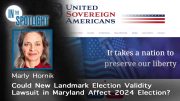
The NSA’s unconstitutional warrantless wiretapping program PRISM has succeeded in uniting much of the political spectrum in a new California-based lawsuit designed to protect civil liberties from the National Security Agency (NSA). The July 16 lawsuit against the NSA joins liberal groups such as People for the American Way and Greenpeace with three California-based Second Amendment groups, the Council on American-Islamic Relations, and libertarian organizations such as NORML (National Organization for the Reform of Marijuana Laws) and the Free Software Foundation.
The dangers of such wiretapping have hit home in recent days. The U.S. Internal Revenue Service’s inspector general has informed Congress that IRS agents have already improperly accessed tax records in order to provide extra scrutiny for political candidates and donors. The IRS inspector general told Senator Chuck Grassley (R-Iowa) in a July 3 letter that in one case “we presented evidence of a willful unauthorized access to the Department of Justice, but the case was declined for prosecution,” and the IG is investigating two other cases of broader targeting of political candidates.
If the federal government can misuse tax returns for political purposes, plaintiffs in the lawsuit might argue, what greater damage could be done with a far wider and more private assortment of personal information?
The lawsuit claims violations of the First, Fourth, and Fifth Amendments to the U.S. Constitution by the NSA surveillance program, in addition to statutory violations of federal law enacted by Congress:
Defendants’ searching of the telephone communications information of Plaintiffs is done (a) without probable cause or reasonable suspicion to believe that Plaintiffs, their members, or their staffs, have committed or are about to commit any crime or engage in any international terrorist activity; (b) without probable cause or reasonable suspicion to believe that Plaintiffs, their members, or their staffs are foreign powers or agents of foreign powers; and (c) without probable cause or reasonable suspicion to believe that Plaintiffs’, their members’, or their staffs’ communications contain or pertain to foreign intelligence information or relate to an investigation to obtain foreign intelligence information.
The phrases “probable cause” and “reasonable suspicion” are terms of art, legally. “Probable cause” is one of the requirements for a proper search by a federal officer under the Fourth Amendment to the U.S. Constitution, while “reasonable suspicion” — a lower threshold of evidence — is a vague term used by government lawyers since passage of the USA Patriot Act for an acceptable federal search. In the case of the NSA, the agency has insisted that it needs no suspicion whatsoever to conduct searches of Americans’ telephone and Internet traffic, permanently storing its data in huge warehouses located at Ft. Meade, Maryland; San Antonio, Texas; and suburban Salt Lake City, Utah.
The addition to the lawsuit of groups that defend the right to keep and bear arms indicates there is a threat to the Second Amendment in NSA surveillance as well, with NSA data collection amounting to a de facto national gun registry. Infringement of the Second Amendment to the U.S. Constitution is not mentioned in the coalition’s lawsuit, however.
In related news, Yahoo, Inc. won a lawsuit against the NSA on July 16 to make information public related to its 2008 lawsuit against the federal spy agency. The NSA had required Yahoo and other Internet service providers to turn over all data that flows over their networks, and handed the companies a gag order preventing them from disclosing the surveillance to their customers. The ruling allows Yahoo to disclose the release of their data to the public, though it will hardly be news to customers after former NSA contractor Edward Snowden already made the information public back in June.



